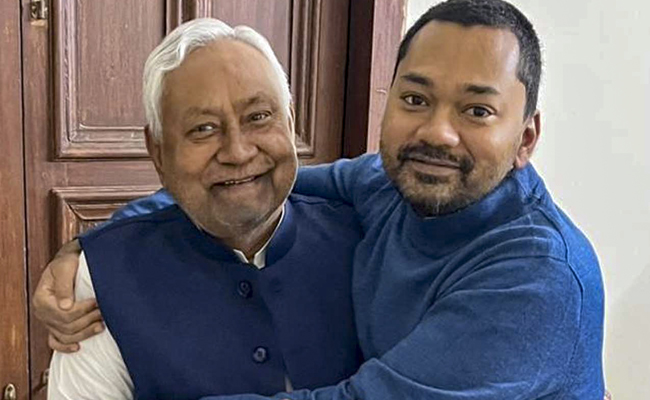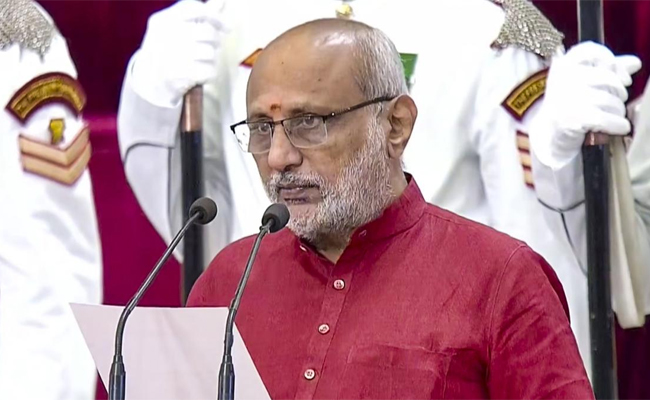New Delhi, July 1: Prime Minister Narendra Modi on Sunday ruled out single GST rate, saying milk and a Mercedes can't be taxed at the same rate while claiming that the new tax regime has showcased Indian cooperative federalism at its best.
"It would have been very simple to have just one slab but it would have meant we could not have food items at zero per cent tax rate. Can we have milk and Mercedes at the same rate?" Modi told Swarajya news magazine in a interview.
Taking a dig at the Congress for its demand of having a single GST rate, he said: "They are effectively saying they will tax food items and commodities, which are currently at zero or 5 per cent, at 18 per cent."
Counting the benefits of GST, Modi said the number of enterprises registered from Independence until now was 66 lakh while in just one year after the introduction of GST, the number of new enterprises registered is 48 lakh.
"Around 350 crore invoices were processed and 11 crore returns were filed. Would we be looking at such numbers, if GST were indeed very complex?" asked the Prime Minister.
He said that the check-posts across the country have been abolished and there are no more queues at state borders.
"Not only are truck drivers saving precious time but also the logistics sector is getting a boost and thereby increasing the productivity of our country. Would this be happening if GST was complex?" he said.
Dubbing GST as a "massive change", Modi said the new tax regime has seen Indian cooperative federalism at its best.
"We consolidated the states and developed proactively a consensus, where earlier governments had failed," he said, adding the reform required a complete reset of one of the world's largest economic systems, merging 17 taxes and 23 cesses into one single tax.
"There are often teething troubles seen when a reform of this magnitude is carried out, but these issues were not only identified but also addressed in real time," he said.
The Prime Minister said that his overnment has reduced taxes on nearly 400 groups of items.
"Around 150 groups of items have zero per cent tax rate. If you look at the rates, for most of the day-to-day commodities, the rate has actually come down. Be it rice, wheat, sugar, spices, etc, total tax levied has been reduced in most cases. Large number of items of daily usage are either exempted or in 5 per cent slab. Some 95 per cent items fall in/below the 18 per cent slab," he said.
Responding to a query that whether the GST was any way linked to his government's economic philosophy of minimum government, Modi said: "GST has been designed to eliminate Inspector Raj with the help of information technology. From returns to refund, everything happens online."
Let the Truth be known. If you read VB and like VB, please be a VB Supporter and Help us deliver the Truth to one and all.
Bengaluru (PTI): Karnataka expects maturity from its Chief Minister, not impulsive commentary on sensitive global affairs, Leader of Opposition in the state Legislative Assembly R Ashoka said on Tuesday.
Ashoka's comments came in response to CM Siddaramaiah’s recent post on ‘X’ regarding US-Iran tensions.
“While speaking of peace, it (US) has chosen the path of war,” the CM had said in the post, as he “strongly condemned” the contradiction, and expressed condolences on the killing of Iran’s supreme leader Ayatollah Ali Khamenei.
Taking to X, Ashoka said, “Karnataka expects maturity from its Chief Minister, not impulsive commentary on sensitive international matters.”
ALSO READ: Bengaluru: Bommai urges govt to build consensus on internal reservation
“India’s foreign policy is determined in New Delhi with strategic depth and national interest as its guiding principle. It is not shaped or driven by domestic vote-bank compulsions or electoral calculations,” he said.
According to him, responsible leaders exercise restraint when global tensions are escalating.
The BJP leader also drew parallels to past incidents, especially Operation Sindoor, where he claimed Siddaramaiah's remarks "created unnecessary controversy and embarrassment for our State, even being amplified and finding applause in hostile foreign media.”
“And now, once again, instead of statesmanship, we are witnessing knee-jerk reactions rooted in appeasement politics,” he said.
Ashoka further said foreign policy is not a stage for ideological posturing.
“It is about safeguarding India’s sovereignty, maintaining strategic balance, and strengthening our global standing,” he said.
Karnataka deserves leadership that reinforces India’s voice on the world stage, not statements that are conveniently celebrated by those who do not wish our nation well, he added.
Ashoka reminded the Chief Minister that his words carry weight and urged him to "rise above partisan calculations" and uphold the dignity of his office.





